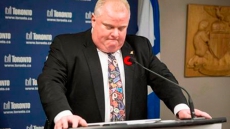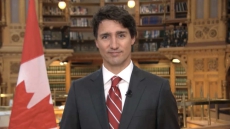IQALUIT, Nunavut — Prime Minister Justin Trudeau shed tears while he apologized on Friday for the way Inuit in northern Canada were treated for tuberculosis in the mid-20th century, calling it colonial and misguided.
Trudeau delivered an apology to the Inuit on behalf of the federal government — words that prompted many in the room to openly weep.
"Today, I am here to offer an official apology for the federal government's management of tuberculosis in the Arctic from the 1940s to the 1960s," he said. "Many of you know all too well how this policy played itself out."
Trudeau acknowledged that many people with TB died after being removed from their families and communities and taken on gruelling journeys south on ships, trains and aircraft.
"We are sorry," Trudeau said. "We are sorry for forcing you from your families, for not showing you the respect and care you deserved. We are sorry for your pain. To the people whose loved ones were taken away, we are sorry. We are sorry for breaking what is most precious — the love of a home."
The prime minister also apologized to those who still do not know what happened to their loved ones.
"To the communities that are facing the consequences of this policy and others, we are sorry," he said. "We are sorry that because of our mistakes, many Inuit don't trust the health care system so they can't get help when they need it. We are sorry for the colonial mindset that drove the federal government's actions."
Prior to the apology, Trudeau was hugged in a long embrace by a woman who told the gathering how her husband died and that his body was not returned from the south.
Trudeau made the visit to the capital of Nunavut a day later than planned after bad weather prevented his plane from landing on Thursday.
He also announced Friday the opening of a database that Inuit families can soon use to find loved ones who died when they were transported south for treatment.
The database is part of a wider initiative called Nanilavut, which means "let's find them" in Inuktitut.
"That's what this project is about," Trudeau said. "About finding and honouring Inuit who went missing during the TB epidemic and bringing healing and closure to everyone who was left behind. I can't begin to imagine what it would be like to lose someone you love and go on never knowing what had happened."
The apology had been in the works for the better part of two years, since Trudeau signed an Inuit-Crown partnership agreement in 2017.
Nunavut Tunngavik Inc., a representative for Inuit in Nunavut, has said it wanted to help family members locate burial sites of those who died during tuberculosis treatment from the 1940s through the 1960s. Their bodies were buried in southern Canada instead of being returned to their relatives.
The mistreatment of Inuit during the TB outbreaks was a "massive human rights failure" from the government of Canada in the treatment of its own citizens, said Natan Obed, president of Inuit Tapiriit Kanatami (ITK).
His organization acts as the national voice of the roughly 60,000 Inuit living in four sections of northern Canada.
The government took far too long to formally acknowledge wrongdoing, Obed said.
"It is a long time and I do wish the apology came sooner."
Inuit who were infected with TB in the mid-20th century were taken into government care, separated from their families and transported aboard ships to sanatoriums in the south of Canada, where they were disconnected from their culture and language.
In many cases, those who died from the disease were buried without their families knowing what happened to them or where they were laid to rest.
James Eetoolook is a 72-year-old TB survivor among a family of survivors.
Over the years, he and seven of his relatives were stricken with TB, including his mother, sisters and brother, who was first diagnosed in the mid-1940s when one of the ships carrying doctors north reached his family's trading post village.
Eetoolook was diagnosed as a 16-year-old and was sent for treatment in Edmonton, where he was in the hospital and bed-ridden for months.
The federal government took too long to diagnose the illness in the Inuit population and didn't do enough to keep track of those who were taken south for treatment.
Now, as vice president of Nunavut Tunngavik Inc., Eetoolook worries that TB is returning to higher levels once again in an age when it simply should not be happening.
In October 2017, then federal health minister Jane Philpott announced the establishment of a task force to develop a plan to eliminate TB among Inuit.
"The government has said it wants to eliminate TB by 2030," Eetoolook said.
"Are they going to do it? Probably not."
According to the most recent Public Health Agency of Canada report on the disease, the average annual rate of tuberculosis among Inuit in Canada a year ago was still more than 290 times higher than Canadian born non-Indigenous people.
The agency cited social housing and overcrowding as one of the main culprits.
More than half of all Nunavut residents live in often cramped social housing.
"Many experience food insecurity, with food prices in Nunavut that are twice those in southern Canada," the March 2018 report stated.
As well, 60 per cent of Nunavut residents smoke.
But the report said progress has been made in tracing all cases of infectious TB, screening of school age children, faster diagnosis and earlier treatments.
As for the apology, and the database, Eetoolook said he believes it will bring closure to many Inuit.
"It will help the families that had loved ones that died," he predicted.
"Some of the (burial grounds) will be hard to find."
Families now have a chance to locate their loved ones, he said.
Obed lamented how the federal government has been criticized for apologizing too much for various past wrongs, but said an apology to the Inuit is necessary as part of healing and reconciliation.
"From the Inuit perspective, apologizing for human rights abuses is never a bad thing," he said.
"We as a country have to also accept responsibility for things that happened and know that apologies are necessary for classes of people whose human rights have been violated."


